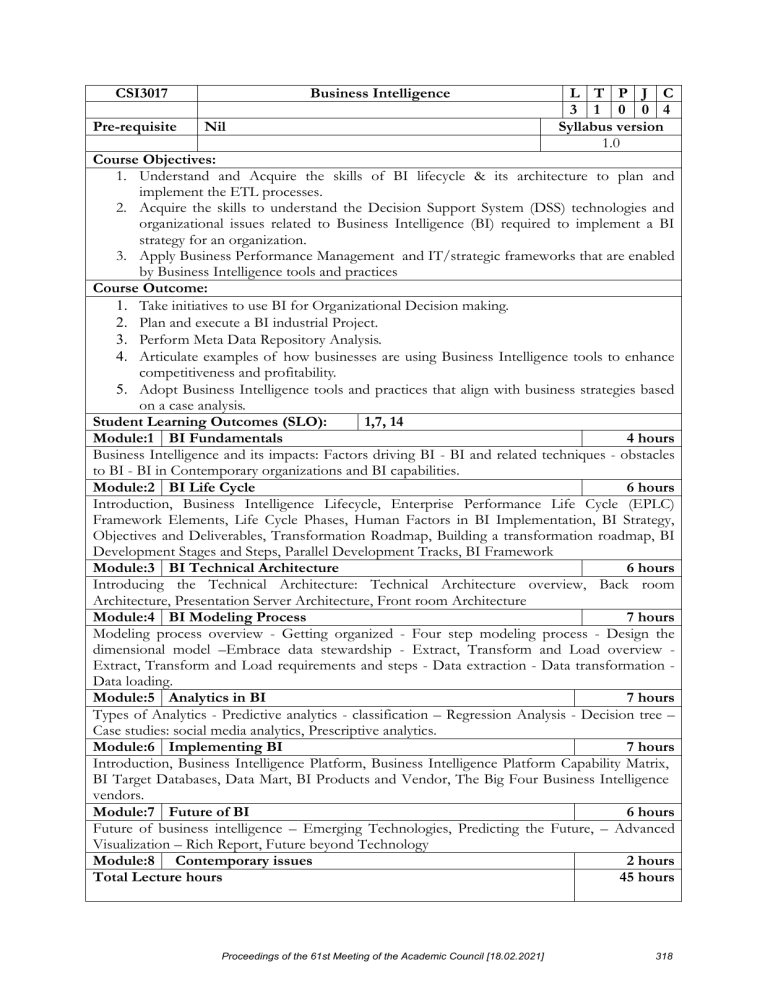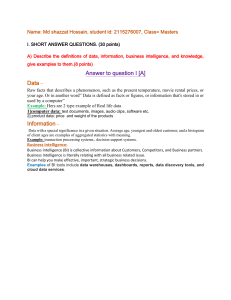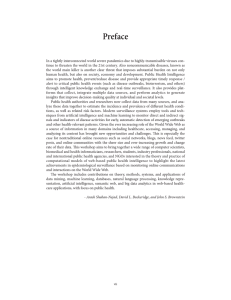
CSI3017 Pre-requisite Business Intelligence Nil L T P J C 3 1 0 0 4 Syllabus version 1.0 Course Objectives: 1. Understand and Acquire the skills of BI lifecycle & its architecture to plan and implement the ETL processes. 2. Acquire the skills to understand the Decision Support System (DSS) technologies and organizational issues related to Business Intelligence (BI) required to implement a BI strategy for an organization. 3. Apply Business Performance Management and IT/strategic frameworks that are enabled by Business Intelligence tools and practices Course Outcome: 1. Take initiatives to use BI for Organizational Decision making. 2. Plan and execute a BI industrial Project. 3. Perform Meta Data Repository Analysis. 4. Articulate examples of how businesses are using Business Intelligence tools to enhance competitiveness and profitability. 5. Adopt Business Intelligence tools and practices that align with business strategies based on a case analysis. Student Learning Outcomes (SLO): 1,7, 14 Module:1 BI Fundamentals 4 hours Business Intelligence and its impacts: Factors driving BI - BI and related techniques - obstacles to BI - BI in Contemporary organizations and BI capabilities. Module:2 BI Life Cycle 6 hours Introduction, Business Intelligence Lifecycle, Enterprise Performance Life Cycle (EPLC) Framework Elements, Life Cycle Phases, Human Factors in BI Implementation, BI Strategy, Objectives and Deliverables, Transformation Roadmap, Building a transformation roadmap, BI Development Stages and Steps, Parallel Development Tracks, BI Framework Module:3 BI Technical Architecture 6 hours Introducing the Technical Architecture: Technical Architecture overview, Back room Architecture, Presentation Server Architecture, Front room Architecture Module:4 BI Modeling Process 7 hours Modeling process overview - Getting organized - Four step modeling process - Design the dimensional model –Embrace data stewardship - Extract, Transform and Load overview Extract, Transform and Load requirements and steps - Data extraction - Data transformation Data loading. Module:5 Analytics in BI 7 hours Types of Analytics - Predictive analytics - classification – Regression Analysis - Decision tree – Case studies: social media analytics, Prescriptive analytics. Module:6 Implementing BI 7 hours Introduction, Business Intelligence Platform, Business Intelligence Platform Capability Matrix, BI Target Databases, Data Mart, BI Products and Vendor, The Big Four Business Intelligence vendors. Module:7 Future of BI 6 hours Future of business intelligence – Emerging Technologies, Predicting the Future, – Advanced Visualization – Rich Report, Future beyond Technology Module:8 Contemporary issues 2 hours Total Lecture hours 45 hours Proceedings of the 61st Meeting of the Academic Council [18.02.2021] 318 Text Book(s) 1. Ramesh Sharda, Dursun Delen, Efraim Turban and David King , “Business Intelligence, Analytics, and Data Science: A Managerial Perspective” , 4th Edition, Pearson Education, 2019. 2. Grossmann W, Rinderle-Ma , “ Fundamental of Business Intelligence”, 1st edition, Springer, 2015. Reference Books 1. Gordon Linoff and Michael Berry , “ Data Mining Techniques: For Marketing, Sales, and Customer Relationship Management” , 3rd edition , Wiley 2011. 2 Joseph H. Silverman , “ Introduction to Number Theory, 4 th Ed. Boston”, Pearson, 2012 3 Ramesh Sharda, Dursun Delen, and Efraim Turban., “Business Intelligence and Analytics: Systems for Decision Support” , 10th edition, Pearson Education, 2014. Mode of Evaluation: CAT / Assignment / Quiz / FAT / Lab Recommended by Board of Studies 11-02-2021 Approved by Academic Council No. 61 Date 18-02-2021 Proceedings of the 61st Meeting of the Academic Council [18.02.2021] 319

